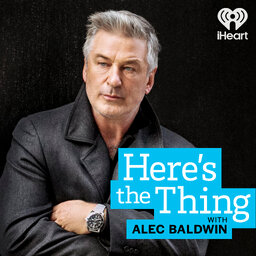Lorne Michaels and Erica and Molly Jong
Lorne Michaels had nothing to lose on October 11, 1975, when Saturday Night Live first aired. He doesn't pull all-nighters any more in preparation for the week’s show, but Michaels tells Alec he is still anxious on Saturdays at 11:30 pm. Michaels believes in the power of live performance and gives SNL hosts the best bits. But aside from the funniest lines, the irreverent Michaels offers little protection. Alec is no exception.
Alec sat down with Erica Jong, author of the 1970s best-seller, Fear Of Flying, and her daughter Molly Jong-Fast. Erica talks candidly about coping with three divorces, and tells Alec she is certain her current marriage will be her last. Meanwhile, daughter Molly had no idea her mom wrote so-called “dirty” books. She does recall her mom being consumed by work and travel, but concludes that her mother’s legacy is about being honest.
Learn more about your ad-choices at https://www.iheartpodcastnetwork.com
In 1 playlist(s)
Here's The Thing with Alec Baldwin
Award-winning actor Alec Baldwin takes listeners into the lives of artists, policy makers and perfor…Social links
Follow podcast
Recent clips

The Phonographic Memory of Marc Shaiman
50:43

Here's The Thing: Trailer
01:41

E Jean Carroll on Writing and Resilience
35:20
 Here's The Thing with Alec Baldwin
Here's The Thing with Alec Baldwin